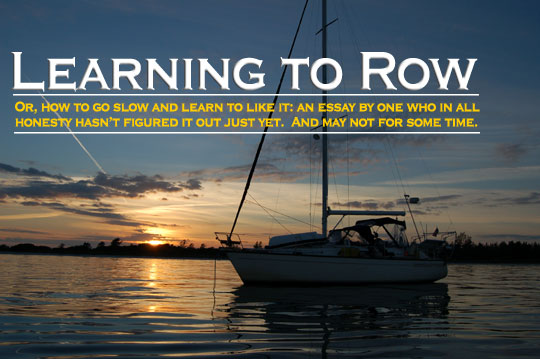
(Okay, just to state the obvious, I looked for a picture of me or at least someone rowing a boat in the title shot, but of the thousands of photos I've taken so far on this cruise, none of them fit that particular description. With that said, let's begin the essay.)
Ahem. Despite all you may have heard, rowing is not easy.
First of all, you don't go fast. I guess nobody expects to go fast in a rowboat, so that part isn't much of a disappointment. The rub is that when you don't know how to row, you end up working so darn hard to go slow. I suppose everybody has seen enough rowing in their lives to grasp the concept: bring the oars forward, feathering the blade horizontal for style, then dig them silently into the water and pull backwards so your craft moves almost soundlessly and gracefully forward. At least that's the theory. For me, it's a struggle to keep my efforts in balance so that I'm not just thrashing about and weaving through the harbor as if I've had two or three two many Margaritas at my last stop. Before I learned how to paddle a canoe (a skill not everyone would agree I have mastered, although I am well acquainted with the infamous "J stroke"), I felt the same way. Perhaps with enough practice, one day I won't have to think about how to move the paddles. My subconscious will guide the oars, freeing my mind to focus on bigger meanings.
Rowing, you see, is all about your state of mind.
Although we have a inflatable boat (zodiac-style, like the Costeaus and Greenpeace used to race around in) with an outboard motor, something about rowing an eight foot long Walker Bay dingy around the harbor had captured my imagination. After all, we were sailors, weren't we, people who valued not so much where you got on the water but how you got there. Anybody could twist the throttle on an outboard and zoom towards the next destination; I endeavored to row there in Thoreau-like fashion. As I write this, we are snug at the dock at Wheeler State Park in northwest Alabama, a long day's cruise towards the Tombigbee waterway leading to the Gulf of Mexico and from there anywhere in the world. Nearby is a forty foot long, three story motor yacht with the name Size Matters II on its stern that could be in the Gulf in two or three days if the owners desired, but in the slip immediately behind it is a 25 foot trawler that moves no faster than our own sailboat. Same destination, different philosophy. (Actually, upon closer examination I later found that I gotten this backwards. Turns out Size Matters belongs to a nice fellow named Rick who throttles those twin diesels back to eight knots, while the little "trawler" has a 130 HP outboard on the back and a planing hull. So my analogy is all turned around, but perhaps that's appropriate when thinking about rowing--see next paragraph.)
One fact that isn't so obvious until you've started rowing is that in a rowboat, you are always looking behind you, savoring where you've been rather than looking ahead to the next stop. You're caught in the simplicity of the moment, one stroke after another. It's honest, patient work. I come from a culture where speed is everything and convenience is king. We push buttons to change the channels on the TV or roll down our car windows. We expect to get what we want instantly over the Internet or overnight if it has to be shipped. The stark contrast of rowing makes you wonder: if life is a journey towards a final destination that (atheists and believers alike) no one really wants to reach, why are we in such a hurry to get there?
Ah, simplicity. I think about my friend Clarence, who hiked the entire Appalachian Trail before going shopping for a cruising boat. You know, I always wanted to hike the AT. Our lives get so convoluted that deliberately depriving yourself of modern conveniences such as roads and cars and Internet connections begins to look mighty appealing. On the trail, you need just three things: food, water, and a sheltered place to rest your feet. I'm not suggesting that rowing implies the same commitment, nor that someone ought to drag a rowboat over 2,600 miles of trail, but I suspect that underneath those who hike and those who row, by choice, are moving to the same slow metronome. Sure, you could get there faster using almost any modern means of transportation, but what would be the point? It's like Walmart: when everything comes cheap, nothing has value and before you know it all the mom-and-pop stores are out of business.
Indeed, there are a lot of reasons to like rowing:
- It's good exercise (thus the rowing machines in gyms).
- Rowing clears your head. Had I been rowing when I wrote the paragraph about the big motor yacht and the little trawler, no doubt I would have been more accurate.
- Rowing is quiet. If loud pipes on motorcycles save lives, and motorcycles are now so popular they're mainstream, then rowboats are the vehicle of choice for today's true rebel.
- At rowing speeds, sudden impacts with docks, waterfowl, or other rowers doesn't hurt as much.
- It's picturesque, and not many people can say that about themselves.
One day years before we departed on our own cruise, a rugged little sailboat from a thousand miles away pulled into our marina for the night. A somewhat craggy man not all that much my senior got off, glanced back at his boat and declared, "Ya know, if it moves faster than five knots, I'm just not interested in it."
I'm not that man, and probably never will be, but with a little more rowing I just might begin to know what he meant.


